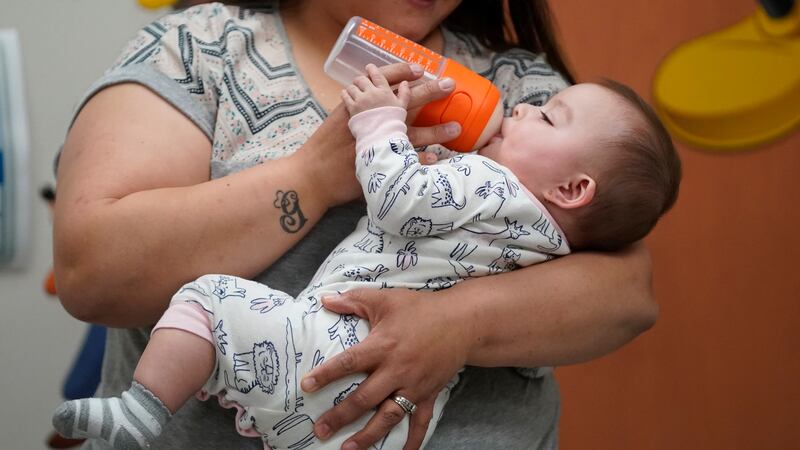President Joe Biden invoked the Defense Production Act on Wednesday in a bid to ease the infant formula shortage that has panicked parents and put babies at risk of inadequate nutrition.
Under the act, suppliers are being ordered to “ensure that manufacturers have the necessary ingredients to make safe, healthy infant formula here at home,” according to a White House fact sheet. That means products that have been ordered by other customers can be redirected to infant formula manufacturers.
Biden also launched “Operation Fly Formula,” directing the Health and Human Services and Agriculture departments to use Department of Defense commercial aircraft to pick up overseas infant formula that meets U.S. health and safety standards and speed its way to store shelves.
Just as it did in the early days of the COVID-19 pandemic, the Department of Defense will use its contracts with commercial air cargo shippers to transport products from manufacturing facilities abroad, bypassing regular air freighting routes, the administration said.
Meanwhile, CNN reported on Wednesday that a group of Senate Democrats want Biden to appoint someone to oversee resolution of the baby formula shortage.
What is the Defense Production Act?
The Defense Production Act dates back to 1950 and the Korean War, when Congress passed it to ensure that needed materials could be diverted to serve the nation’s priorities. It was used then for the civil defense and war mobilization effort.
The act lets the president require businesses to prioritize contracts for material needed in defense of the country, whether it hurts the businesses financially or not. The law can be used to prevent hoarding and price-gouging. Potential penalties include a felony conviction, up to a $10,000 fine and even incarceration.
The Defense Production Act has been invoked numerous times since the 1950s, including during COVID-19, when President Donald Trump used it to bolster manufacture of N-95 masks, ventilators, testing resources and other medically needed materials, according to a blog by the House of Representatives’ Energy and Commerce committee Republicans.
The Washington Post reported that Biden used the act to get Pfizer the equipment it needed to scale up production of the vaccine it developed with Germany’s BioNTech. He also used it to address a shortage of fire hoses and help firefighters battling wildfires.
When will the formula shortage end?
A number of things happened this week that may bring an end to the formula crisis, which began in February when Abbott Nutrition issued a voluntary recall of infant formula following news that several infants had become sick and two had died. Federal officials have been investigating whether the formula was involved in the illness.
No link was found through testing, though Abbott Nutrition’s Sturgis, Michigan, baby formula manufacturing plant was shuttered after bacteria was found in the plant, though not in any of the products. The FDA and Abbott just reached an agreement that, if approved by a federal judge, could reopen the facility in as little as two weeks, though it would still take several weeks for the formula it begins producing to reach store shelves. The agreement outlines how Abbott will overhaul its safety protocols, NPR reported. The Sturgis plant is reportedly the nation’s largest formula-manufacturing facility.
Meanwhile, Congress is considering two bills this week related to the formula crisis.
“One bill expected to have wide bipartisan support would give the secretary of the Department of Agriculture the ability to issue a narrow set of waivers in the event of a supply disruption. The goal is to give participants in an assistance program commonly known as WIC the ability to use vouchers to purchase formula from any producer rather than be limited to one brand that may be unavailable. The WIC program accounts for about half of infant formula sales in the U.S.,” The Associated Press reported.
The article continued, “The other measure, a $28 million emergency spending bill to boost resources at the Food and Drug Administration, is expected to have less bipartisan support and it’s unclear whether the Senate will take it up.”
Rep. Bill Huizenga, R-Michigan, accused the second bill of “throwing more FDA staff at a problem that needs more production, not more FDA staff,” the AP noted.


